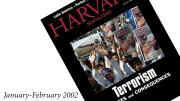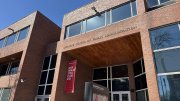In the wake of the Boston Marathon bombings this past Monday, and tragic death of an MIT police officer last night and the unfolding manhunt this morning, Harvard Magazine points readers to an archival roundtable discussion on terrorism—prepared in the wake of the 9/11 attacks—for perspective.
"Understanding Terrorism" was published in the January-February 2002 issue. The participants included the following, shown with their current affiliations:
- Eva Bellin is now Kraft professor of Arab politics at Brandeis University.
- Ashton B. Carter is now United States Deputy Secretary of Defense.
- Philip B. Heymann is Ames professor of law.
- David Little, Dunphy professor emeritus of the practice in religion, ethnicity, and international conflict, is now associated with the University of Virginia School of Law.
- Louise M. Richardson is now Principal and Vice-Chancellor of the University of St. Andrews.
- Jessica E. Stern is an independent expert on terrorism.









